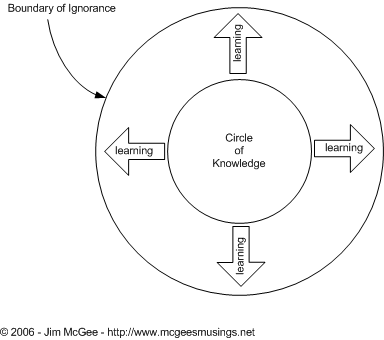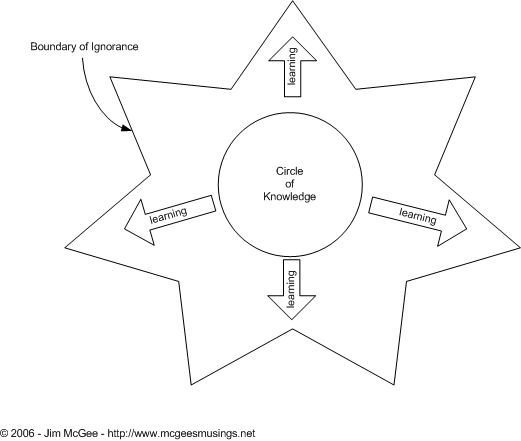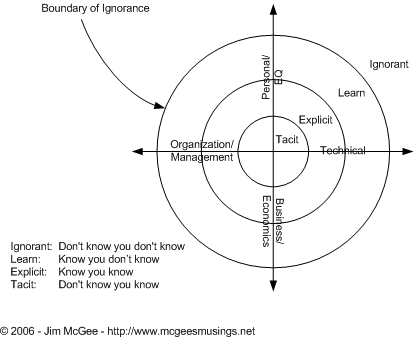My latest column at Enterprise Systems Journal appears today. In it I take a look at the notion of developing an ongoing learning agenda by focusing on the boundaries of your ignorance. One key graf:
The late Isaac Asimov once observed that “the most exciting phrase to hear in science, the one that heralds new discoveries, is not ‘Eureka!’ but ‘that’s funny’.” What piques your curiosity is an excellent indicator of where your learning energies ought to be focused. Curiosity is an edge phenomenon where new inputs have enough structure and content from your perspective to emerge as something more than background noise and chaos, yet are not so well-defined as to be immediately classifiable. Becoming more mindful of the terminology, issues, and phenomenon that are separating themselves from background noise helps identify topics you should consider investing learning time in. [IT Learning at the Boundaries of Your Ignorance]
I started thinking about “boundaries of ignorance” and “circles of knowledge” while putting together a presentation on learning and knowledge management. I began with the simple notion of learning as expanding your circle of knowledge and quickly hit on the notion that expanding my circle of knowledge was simultaneously expanding the boundaries of my ignorance. The more things I learned, the more things I became aware of that I didn’t know.
In my teens, that manifested itself as reading everything I could lay my hands on in the quest for the “one right answer.” I wasn’t as smart as Alan Kay to realize early on that books had limits or could be wrong. I was so engrossed in the world that books opened up for me that it took quite a while to grasp their limits. My dad used to say that he could always tell when I had finished a book by my fervent belief in some new world view. In retrospect, I suspect my ignorance was growing faster than my knowledge. But I was more focused on the inside of the circle than on its contact with the rest of knowledge.
My first cut at visualizing this image was along the following lines:

In this version, learning can be viewed as either expanding your circle of knowledge or as increasing your boundary of ignorance. So, the more you learn the more you know, but also the more you know that you don’t know. Depending on your temperament, this can be either encouraging or discouraging to your efforts to continue learning.
Formal schooling focuses attention on the inside of the circle and keeps you carefully inside the boundaries. The credentialing system of education looks backward at what you are supposed to have learned. On the plus side, a good school environment helps keep you from falling off the edge into material you are unable to understand or appreciate. I can remember trying to read various books on philosophy in my wildly eclectic romps through the public library during my high school days. All fields have their professional vocabulary and one purpose of schools is to introduce you to that vocabulary in a coherent order. While we are hard-wired to learn spoken languages simply by being immersed in them, I don’t think the same strategy would work as well for learning calculus or modern European history.
The danger of formal schooling (even when well done) is too much focus on what you already know. If you don’t push yourself out to the boundaries, you seriously limit your opportunities for significant new learning. Formal schooling tends to overly protect you from failure and, therefore, from opportunities for deeper learning. Granted, I’ve come to appreciate the importance of failure in real learning courtesy of my work with Roger Schank. The more important learning becomes as an ongoing career development activity, the more you have to deal with not knowing. This can become a real challenge as you advance in your career and as you become recognized for your expertise.
Over time and as you get farther away from your school days, your circle of knowledge starts to get spiky:
 You become more expert and informed on certain topics at the expense of others. The nice, well-rounded, circle that might have characterized the end of a classical liberal arts education has been replaced with the distinctive profile of an expert in some particular domain.
You become more expert and informed on certain topics at the expense of others. The nice, well-rounded, circle that might have characterized the end of a classical liberal arts education has been replaced with the distinctive profile of an expert in some particular domain.
If you assume that you do, in fact, need to continue to learn, regardless of your current level of expertise, is there some way to use this notion of the “boundary of ignorance” to guide ongoing learning? For an individual topic,
Monitoring your curiosity consists of becoming aware of terms, tools, topics, and techniques that you are encountering in your environment, yet are not part of your current knowledge and skills. As these become visible to you, the next step is to cluster and chunk that material into a learning agenda; a sequence of topics ranging from the nearly familiar to the barely recognized. [IT Learning at the Boundaries of Your Ignorance]
In addition to tuning into the language of a topic, you can also start to identify the experts and authorities who are working in the domain.
In general, your learning agenda is not likely to be a single topic. Instead, you will be pushing out along multiple dimensions. It might be helpful to visualize that process in terms of progress along several learning vectors. For example, I might group my learning activities along the following dimensions:

This larger picture of learning would help assess what kind of balance I was striking across topics and whether that balance was suitable.
What you are left with at this point is a map for what you want to learn based on the edges of what you know now coupled with what captures your curiosity. What comes next is the effort to learn topic by topic and to fit that learning into the demands of performing.
 Hans Rosling, professor of public health, speaker extraordinaire, software entrepreneur and one of the best illustrators of fact-based research and policy discussions I have ever seen, is
Hans Rosling, professor of public health, speaker extraordinaire, software entrepreneur and one of the best illustrators of fact-based research and policy discussions I have ever seen, is 